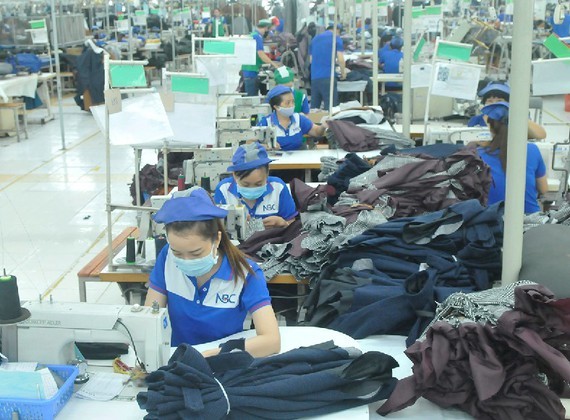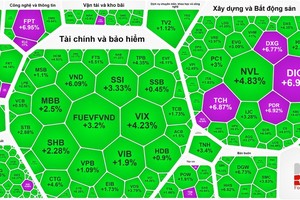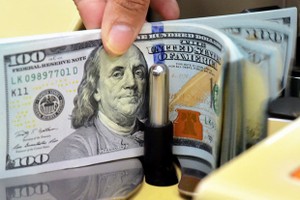
Playing the role of a thermometer, the stock market shares the same beat with the economy. When the Covid-19 pandemic broke out in Vietnam at the beginning of this year, the stock market plunged steeply until the end of March. During this period, the VN-Index lost more than 300 points, down by more than 30 percent. However, when the pandemic was under control, the market had an upward trend that lasted from April to June, with an increase of 36 percent compared to before.
When the Covid-19 pandemic came back in July this year, the stock market also made strong declines, decreasing by nearly 40 points per trading session. Fortunately, the losing trend did not last long. Noticeably, in trading sessions with sharp drops, the liquidity was extremely high, proving that the cash flow for bottom-fishing was very good. Experts said that the relatively good recovery of the stock market recently was contributed by the Government's efforts to control the Covid-19 pandemic, which has built up confidence among investors that the second wave of Covid-19 if it breaks out, is likely to be successfully controlled.
Along with that, economic growth in the first six months of this year was still a positive figure, while many countries were posting negative growths. Many leading enterprises still posted impressive growth, and business results of some industries, such as telecommunications, technology, construction, and banking, were still optimistic.
Securities companies explained that after the first wave of Covid-19, Vietnam's stock market decreased by nearly 30 percent compared to the beginning of the year, creating a more attractive valuation buffer zone. Normally, after the period of bottom-forming, the economy begins to recover and grow, the stock market will benefit first. Along with that, the State Bank of Vietnam's operating interest rate cut has created a more upbeat sentiment for the stock market, because this move shows the consistent policy of the Government in reducing the lending interest rate and supporting enterprises. This is also a factor supporting economic growth, thereby creating bullish sentiment for investors.
The representative of Vietnam International Securities Joint Stock Company said that lowering the operating interest rate has caused the deposit interest rates to reduce, so the savings channel is no longer attractive. Meanwhile, the real estate investment channel has also been facing difficulties due to the impacts of the Covid-19 pandemic and the need for large and long-term capital. Gold is expected to continue to follow the global gold price trend. The current gold price is at a high level and is quite risky to buy because the gap between the buying and selling prices is high. Besides, the domestic gold price is several million Vietnamese dongs higher than the global gold price. Meanwhile, the stock market has fallen sharply compared to the beginning of this year, and currently has an attractive valuation with many stocks capable of helping investors to earn profits in short, medium, and long term.
According to the Vietnam Securities Depository (VSD), domestic investors opened more than 35,000 new accounts in June this year. Of which, the majority of accounts are individual ones. In the last four months, domestic investors have opened nearly 137,000 new accounts, accounting for 73 percent of the number of new accounts opened in 2019.
By the end of June, the number of accounts on the stock market reached more than 2.54 million. These F0 investors (new investors) joined the market to catch bottoms after a chain of strong declines of the market. This is considered as a smart investment cash flow, flowing from other investment channels to the stock channel. The participation of these new investors significantly contributed to the VN Index's strong recovery from 650 points at the end of March to the current level of over 870 points, only 6 percent lower than that before the pandemic.
When the Covid-19 pandemic came back in July this year, the stock market also made strong declines, decreasing by nearly 40 points per trading session. Fortunately, the losing trend did not last long. Noticeably, in trading sessions with sharp drops, the liquidity was extremely high, proving that the cash flow for bottom-fishing was very good. Experts said that the relatively good recovery of the stock market recently was contributed by the Government's efforts to control the Covid-19 pandemic, which has built up confidence among investors that the second wave of Covid-19 if it breaks out, is likely to be successfully controlled.
Along with that, economic growth in the first six months of this year was still a positive figure, while many countries were posting negative growths. Many leading enterprises still posted impressive growth, and business results of some industries, such as telecommunications, technology, construction, and banking, were still optimistic.
Securities companies explained that after the first wave of Covid-19, Vietnam's stock market decreased by nearly 30 percent compared to the beginning of the year, creating a more attractive valuation buffer zone. Normally, after the period of bottom-forming, the economy begins to recover and grow, the stock market will benefit first. Along with that, the State Bank of Vietnam's operating interest rate cut has created a more upbeat sentiment for the stock market, because this move shows the consistent policy of the Government in reducing the lending interest rate and supporting enterprises. This is also a factor supporting economic growth, thereby creating bullish sentiment for investors.
The representative of Vietnam International Securities Joint Stock Company said that lowering the operating interest rate has caused the deposit interest rates to reduce, so the savings channel is no longer attractive. Meanwhile, the real estate investment channel has also been facing difficulties due to the impacts of the Covid-19 pandemic and the need for large and long-term capital. Gold is expected to continue to follow the global gold price trend. The current gold price is at a high level and is quite risky to buy because the gap between the buying and selling prices is high. Besides, the domestic gold price is several million Vietnamese dongs higher than the global gold price. Meanwhile, the stock market has fallen sharply compared to the beginning of this year, and currently has an attractive valuation with many stocks capable of helping investors to earn profits in short, medium, and long term.
According to the Vietnam Securities Depository (VSD), domestic investors opened more than 35,000 new accounts in June this year. Of which, the majority of accounts are individual ones. In the last four months, domestic investors have opened nearly 137,000 new accounts, accounting for 73 percent of the number of new accounts opened in 2019.
By the end of June, the number of accounts on the stock market reached more than 2.54 million. These F0 investors (new investors) joined the market to catch bottoms after a chain of strong declines of the market. This is considered as a smart investment cash flow, flowing from other investment channels to the stock channel. The participation of these new investors significantly contributed to the VN Index's strong recovery from 650 points at the end of March to the current level of over 870 points, only 6 percent lower than that before the pandemic.
From now until the end of the year, the notable highlights of the stock market that analysts give to investors include the EU-Vietnam Free Trade Agreement (EVFTA) has officially taken effect from August 1. The market expects this to be a push to accelerate medium and long-term economic growth. The elimination of more than 99 percent of tariff lines following the schedule will facilitate products with export advantages to the EU market, such as textiles, footwear, agricultural products, aquatic products, and wooden products.
Moreover, when joining EVFTA, Vietnam can become an attractive destination for foreign investors. A large amount of capital from European enterprises will be invested in Vietnam, helping to improve competition and promote the domestic market to develop stronger. Besides, the promotion of public investment of the Government will strongly support the domestic construction and building materials industries.
Moreover, when joining EVFTA, Vietnam can become an attractive destination for foreign investors. A large amount of capital from European enterprises will be invested in Vietnam, helping to improve competition and promote the domestic market to develop stronger. Besides, the promotion of public investment of the Government will strongly support the domestic construction and building materials industries.
Investment cash flow is also a decisive factor for the trend of the stock market, including foreign investment capital. Viet Dragon Securities Corporation assesses that Vietnam's stock market will be unlikely to have the second strongest sell-off from foreign investors as in the last March and April, although the situation of the Covid-19 pandemic remains unpredictable. The main reason for the sell-off in Vietnam and other markets is that investors are cautious of liquidity. However, this will no longer cause another sell-off at this moment thanks to the strong liquidity support of the US Federal Reserve (FED) and other central banks. Bloomberg also recently recorded the return of foreign investors through exchange-traded funds (ETFs) in some emerging markets over the past three months, including Vietnam. Particularly, the VanEck ETF attracted US$11 million, and the FTSE Vietnam ETF drew $6 million in July compared to the withdrawal of $26 million and $19 million, respectively, in March on Vietnam's stock market. According to SSI Securities Company, the capital flow from ETFs flowed positively in July with a total net buying value of nearly VND700 billion on Vietnam's stock market. This is the third consecutive month that a positive capital flow has flowed into Vietnam's stock market. Reports from other securities companies also showed that the capital flow into Vietnam’s stock market in the second half of July was higher than the withdrawal volume in the first half of the month. In July, a total of $6.5 million of foreign capital was added into investment funds in Vietnam. In the first week of August this year, ETFs in Vietnam received $7.6 million of net capital. Last week, the capital flow into the market continued to remain at a positive level with a value of $9 million, the highest in the past four weeks.
MBS Securities Company: Considering industrial park real estate stocks
With the current context, short-term trading or surfing should be limited. Investment opportunities in stock groups should have a vision from six months to one year. The stock groups that can prioritize investment are health-care and medical equipment, food, foodstuffs, and essential products. Besides, there are defensive stocks, such as electricity, and water, or stocks that benefit from public investment and the movement of FDI inflows like industrial zone real estate. Enterprises tend to shift production from China to neighboring countries, including Vietnam. This wave of investment shift has made industrial zone real estate companies become bright spots when they have posted positive business results.
SSI Securities Company: Lower interest rates will support the stock market
The stock market is affected by mixed factors. In the remaining months of this year, the developments of the Covid-19 pandemic will continue to influence the macro and corporate prospects. The increase in unemployment in the world also affects consumer demand and economic growth, thereby negatively hurting the stock market. However, the abundant liquidity in the banking system and the environment of low-interest rates will continue to be the factors that support Vietnam's stock market more positively in the coming period.
With the current context, short-term trading or surfing should be limited. Investment opportunities in stock groups should have a vision from six months to one year. The stock groups that can prioritize investment are health-care and medical equipment, food, foodstuffs, and essential products. Besides, there are defensive stocks, such as electricity, and water, or stocks that benefit from public investment and the movement of FDI inflows like industrial zone real estate. Enterprises tend to shift production from China to neighboring countries, including Vietnam. This wave of investment shift has made industrial zone real estate companies become bright spots when they have posted positive business results.
SSI Securities Company: Lower interest rates will support the stock market
The stock market is affected by mixed factors. In the remaining months of this year, the developments of the Covid-19 pandemic will continue to influence the macro and corporate prospects. The increase in unemployment in the world also affects consumer demand and economic growth, thereby negatively hurting the stock market. However, the abundant liquidity in the banking system and the environment of low-interest rates will continue to be the factors that support Vietnam's stock market more positively in the coming period.
























